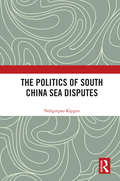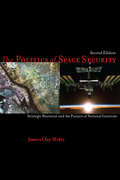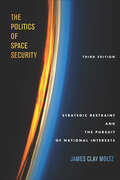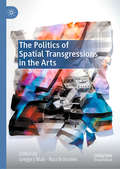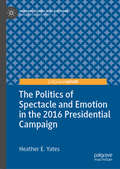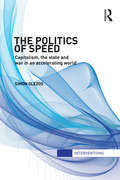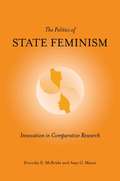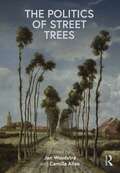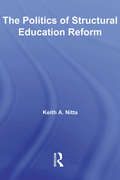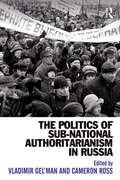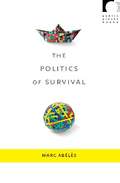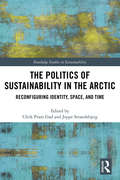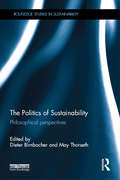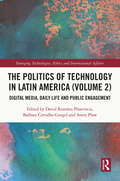- Table View
- List View
The Politics of Social Welfare in America
by Glenn David MackinThe Politics of Social Welfare in America examines how politicians, theorists, and citizens discuss need, welfare, and disability with respect to theoretical and political projects. Glenn David Mackin argues that participants in these discussions often miss the way their perceptions of those in need shape their discourse. Professor Mackin also explores disability rights groups and welfare rights activism in the 1960s and 1970s to examine the ways that those designated as needy or incompetent often challenge these designations, thus making the issue of welfare an ongoing conflict over who counts as competent and generating new ways of understanding democracy and equality.
The Politics of South China Sea Disputes
by Nehginpao KipgenThis book is a comprehensive political study of the South China Sea (SCS) disputes. With over US $5 trillion worth of trade passing through it every year and a history of military flashpoints, the SCS is invariably a hotbed of great power rivalry. This book: Traces the history of the disputes from the 19th century until recent developments; Examines recent arbitrations including the ruling on the case filed by the Philippines at the Permanent Court of Arbitration (PCA) at the Hague, the Netherlands; Studies these disputes in a theoretical framework, utilising international relations theories, particularly realism, liberalism and constructivism; Explores how the ASEAN states approach the SCS disputes, and analyses dispute settlement under international law. Drawing on extensive fieldwork and interviews with experts and those directly involved with the disputes, this book will be indispensable to students and researchers of maritime studies, security studies, politics and international relations, geopolitics, and Asian studies.
The Politics of Space Security
by James Clay MoltzMoltz (national security affairs, US Naval Postgraduate School) traces military space developments from 1957 to the present--including weapons tests and deployments, arms control treaties, and less formal cooperative agreements--in order to understand underlying causes and possible future developments relevant to the policy debate over military uses of space and defense of space-based assets by the United States. After discussing the historical and conceptual background, he focuses on how competition between the Soviet Union and the United States grew more limited following an initially hostile, open-ended, and military-led space programs as both sides accepted mutual constraints on deployable weapons in return for safe access to space for other uses. He next examines the period between the collapse of the Soviet Union and 2001, noting that the US generally maintained self-restraint and cooperative space relations even in the face of the decline of Russian space capabilities. Finally, he looks at the very different dynamics under the Bush administrations and analyzes the underlying factors for the change and concludes with a discussion of possible space futures, ranging from atomized and state-centric to highly integrated and transnational. Annotation ©2008 Book News, Inc. , Portland, OR (booknews. com)
The Politics of Space Security: Strategic Restraint and the Pursuit of National Interests
by James Clay MoltzAt a time when no other country enjoys the advantages that the United States currently reaps from space, some U.S. officials argue that U.S. space defenses will be needed to protect access to critical military and civilian assets in orbit. Others argue that space should be a valuable "sanctuary" from deployed weapons and military conflict. To inform this debate—and develop meaningful guidelines for the future—Clay Moltz has undertaken the only comprehensive study of the first 50 years of space security, highlighting the main trends in military space developments, their underlying causes, and the factors that are likely to influence their future course. What emerges is a picture of surprising military restraint shown by the United States and the Soviet Union in space, and the inescapable conclusion that the only way forward is through a multilateral commitment to interdependent, environmentally focused space security.
The Politics of Space Security: Strategic Restraint and the Pursuit of National Interests, Third Edition
by James Clay MoltzFor the past sixty years, countries have conducted military and civilian activities in space, often for competitive purposes. But they have not yet fought in this environment. This book examines the international politics of the space age from 1957 to the present, the reasons why strategic restraint emerged among the major military powers, and how recent trends toward weaponization may challenge prior norms of conflict avoidance. James Clay Moltz analyzes the competing demands of national interests in space against the shared interests of all spacefarers in preserving the safe use of space in the face of emerging threats, such as man-made orbital debris. This new edition offers analysis of the 2011 to 2018 period, including the second term of President Obama and the beginning of the Trump administration. Focusing on great power competition and cooperation, as well as questions related to the sustainability of current and future national space policies, The Politics of Space Security is an authoritative history of the space age.
The Politics of Spatial Transgressions in the Arts
by Gregory Blair Noa BronsteinThis book is an anthology of the varied strategies of spatial transgressions and how they have been implemented through the arts as a means to resist, rejuvenate, reclaim, critique or cohabitate. The book is divided into two sections – Displacements and Disruptions. The first section discusses the ramifications of the spatial displacements of bodies, organizations, groups of people and ethnicities, and explores how artists, theorists and arts organizations have an attentive history of revealing and reacting to the displacement of peoples and how their presence or absence radically reconfigures the value, identity, and uses of place. In the second section, each author considers how aesthetic strategies have been utilized to disrupt expected spatial experiences and logic. Many of these strategies form radical alternative methodologies that include transgressions, geographies of resistance, and psychogeographies. These spatial performances of disruption set into motion a critical exchange between the subject, space and materiality, in which ideology and experience are both produced/spatialized and deconstructed/destabilized.
The Politics of Species
by Raymond Corbey Annette LanjouwThe assumption that humans are cognitively and morally superior to other animals is fundamental to social democracies and legal systems worldwide. It legitimises treating members of other animal species as inferior to humans. The last few decades have seen a growing awareness of this issue, as evidence continues to show that individuals of many other species have rich mental, emotional and social lives. Bringing together leading experts from a range of disciplines, this volume identifies the key barriers to a definition of moral respect that includes nonhuman animals. It sets out to increase concern, empathy and inclusiveness by developing strategies that can be used to protect other animals from exploitation in the wild and from suffering in captivity. The chapters link scientific data with normative and philosophical reflections, offering unique insight into controversial issues around the ethical, political and legal status of other species.
The Politics of Spectacle and Emotion in the 2016 Presidential Campaign (Palgrave Studies in US Elections)
by Heather E. YatesThis book examines the highly emotional context of the 2016 US presidential campaign through the scope of political theater and emotional attribution. It takes inventory of the political landscape that defined the campaign and advances the argument that the campaign’s high intensity generated a more interest-attentive citizenry and became an exercise in political theater. A framework operationalizing the components of political spectacle anchors the analysis treating emotions, affect transfer and the rise of negative partisanship. The analytical scope is focused specifically on voters’ emotional responses toward Donald Trump and Hillary Clinton and empirically demonstrates the effects of discrete feelings on five emotional dimensions including pride, hope, fear, anger, and disgust on attitudes about issues ranging from the economy to immigration to the 2016 Supreme Court vacancy. Anchored in the Affective Intelligence Theory and affect transfer, the findings lend support to the principles of negative partisanship that characterized the 2016 presidential contest.
The Politics of Speed: Capitalism, the State and War in an Accelerating World (Interventions)
by Simon GlezosEveryone agrees that the world is accelerating. With advances in communication, transportation and information processing technologies, it is clear that the pace of events in global politics is speeding up at an alarming rate. The implications of this new speed however, continue to be a significant source of debate. Will acceleration lead to a more interconnected, productive, peaceful, and humane world; or a nightmarish descent into ecological devastation, economic exploitation and increasingly violent warfare? The Politics of Speed attempts to map the contours of the new global space of speed, and investigates key issue areas – including democratic governance, warfare, capitalism, globalization and transnational activism – to uncover the ways in which acceleration is shaping the world. The book uses contemporary political theory (especially the works of Deleuze and Guattari) to develop an ontological account of speed, showing how its effects are frequently far more complex and surprising than we might expect. The result is an attempt to craft a way of engaging with global acceleration that might help avoid the dangers of speed, while embracing the possibilities it provides us with to produce a safer, more egalitarian, democratic and pluralistic world.
The Politics of State Feminism: Innovation in Comparative Research
by Mcbride Dorothy E. Mazur Amy G.The Politics of State Feminism addresses essential questions of women's movement activism and political change in western democracies. The authors—top gender and politics scholars—provide a comparative analysis of the effectiveness of government agencies and women's movements regarding women’s policy issues—if, how, and why they form a kind of state feminism. The central research questions are examined across five issue areas in thirteen postindustrial democracies in Europe and North America from the 1960s through the early 2000s. The authors explore a range of topics drawn from contemporary theory, interactions between descriptive and substantive representation, and the place of institutions in democratic change. Using the innovative qualitative and quantitative methods employed by the Research Network on Gender Politics and the State, the authors have developed a new body of theories about the role of state feminism and how it can help further women’s rights.
The Politics of Street Trees
by Jan WoudstraThis book focuses on the politics of street trees and the institutions, actors and processes that govern their planning, planting and maintenance. This is an innovative approach which is particularly important in the context of mounting environmental and societal challenges and reveals a huge amount about the nature of modern life, social change and political conflict. The work first provides different historical perspectives on street trees and politics, celebrating diversity in different cultures. A second section discusses street tree values, policy and management, addressing more contemporary issues of their significance and contribution to our environment, both physically and philosophically. It explores cultural idiosyncrasies and those from the point of view of political economy, particularly challenging the neo-liberal perspectives that continue to dominate political narratives. The final section provides case studies of community engagement, civil action and governance. International case studies bring together contrasting approaches in areas with diverging political directions or intentions, the constraints of laws and the importance of people power. By pursuing an interdisciplinary approach this book produces an information base for academics, practitioners, politicians and activists alike, thus contributing to a fairer political debate that helps to promote more democratic environments that are sustainable, equitable, comfortable and healthier.
The Politics of Structural Education Reform (Routledge Research in Education #Vol. 13)
by Keith A. NittaEducation policymaking is traditionally seen as a domestic political process. The job of deciding where students will be educated, what they will be taught, who will teach them, and how it will be paid for clearly rests with some mix of district, state, and national policymakers. This book seeks to show how global trends have produced similar changes to very different educational systems in the United States and Japan. Despite different historical development, social norms, and institutional structures, the U.S. and Japanese education systems have been restructured over the past dozen years, not just incrementally but in ways that have transformed traditional power arrangements. Based on 124 interviews, this book examines two restructuring episodes in U.S. education and two restructuring episodes in Japanese education. The four episodes reveal a similar politics of structural education reform that is driven by symbolic action and bureaucratic turf wars, which has ultimately hindered educational improvement in both countries.
The Politics of Sub-National Authoritarianism in Russia (Post-Soviet Politics)
by Cameron RossBy the end of the 2000s Russia had become an increasingly authoritarian state, which was characterised by the following features: outrageously unfair and fraudulent elections, the existence of weak and impotent political parties, a heavily censored (often self-censored) media, weak rubber-stamping legislatures at the national and sub-national levels, politically subordinated courts, the arbitrary use of the economic powers of the state, and widespread corruption. However, this picture would be incomplete without taking into account the sub-national dimension of these subversive institutions and practices across the regions of the Russian Federation. After the collapse of the Soviet Union, sub-national political developments in Russia became highly diversified and the political map of Russia’s regions became multi-faceted. The period of 2000s demonstrated a drive on the part of the Kremlin to re-centralise politics and governance to the demise of newly-emerging democratic institutions at both the national and sub-national levels. Yet, federalism and regionalism remain key elements of the research agenda in Russian politics, and the overall political map of Russia’s regions is far from being monotonic. Rather, it is similar to a complex multi-piece puzzle, which can only be put together through skilful crafting. The 12 chapters in this collection are oriented towards the generation of more theoretically and empirically solid inferences and provide critical evaluations of the multiple deficiencies in Russia’s sub-national authoritarianism, including: principal-agent problems in the relations between the layers of the ’power vertical’, unresolved issues of regime legitimacy that have resulted from manipulative electoral practices, and the inefficient performance of regional and local governments. The volume brings together a team of international experts on Russian regional politics which includes top scholars from Britain, Canada, Russia and the USA.
The Politics of Supranational Banking Supervision in Europe (ISSN)
by David Howarth Huw MacartneyEurope’s sovereign debt crisis and the accompanying national bank crises in the European Union brought bank regulation and supervision to the top of the EU policy agenda. In a few short years, we have witnessed a ‘great leap forward’ for European integration marked by over a dozen pieces of EU legislation shaping the operation of banks, rules on bank capital, reconfigured supervisory agencies, and Banking Union. The significance of these measures lies however, in the fact that they constitute the most dramatic transfer of policy-making powers to the European level since the start of Economic and Monetary Union in 1999. This volume addresses the three main political battles behind the adoption of these new regulatory and supervisory policies. First, it examines divisions among states, both according to their domestic institutional structures, including distinct financial systems, as well as their creditor or debtor status in the crisis. Second, it studies the battle over national versus supranational jurisdiction. Third, it explores the conflictual process of policy learning and the activation of epistemic communities who claim competence to address the crisis. This book was originally published as a special issue of the journal West European Politics.
The Politics of Surveillance and Response to Disease Outbreaks: The New Frontier for States and Non-state Actors (Global Health)
by Jeremy R. Youde Sara E. DaviesThe capacity to conduct international disease outbreak surveillance and share information about outbreaks quickly has empowered both State and Non-State Actors to take an active role in stopping the spread of disease by generating new technical means to identify potential pandemics through the creation of shared reporting platforms. Despite all the rhetoric about the importance of infectious disease surveillance, the concept itself has received relatively little critical attention from academics, practitioners, and policymakers. This book asks leading contributors in the field to engage with five key issues attached to international disease outbreak surveillance - transparency, local engagement, practical needs, integration, and appeal - to illuminate the political effect of these technologies on those who use surveillance, those who respond to surveillance, and those being monitored.
The Politics of Survival
by Marc AbélésIn this provocative analysis of global politics, the anthropologist Marc Abls argues that the meaning and aims of political action have radically changed in the era of globalization. As dangers such as terrorism and global warming have moved to the fore of global consciousness, foreboding has replaced the belief that tomorrow will be better than today. Survival, outlasting the uncertainties and threats of a precarious future, has supplanted harmonious coexistence as the primary goal of politics. Abls contends that this political reorientation has changed our priorities and modes of political action, and generated new debates and initiatives. The proliferation of supranational and transnational organizations--from the European Union to the World Trade Organization (WTO) to Oxfam--is the visible effect of this radical transformation in our relationship to the political realm. Areas of governance as diverse as the economy, the environment, and human rights have been partially taken over by such agencies. Non-governmental organizations in particular have become linked with the mindset of risk and uncertainty; they both reflect and help produce the politics of survival. Abls examines the new global politics, which assumes many forms and is enacted by diverse figures with varied sympathies: the officials at meetings of the WTO and the demonstrators outside them, celebrity activists, and online contributors to international charities. He makes an impassioned case that our accounts of globalization need to reckon with the preoccupations and affiliations now driving global politics. The Politics of Survival was first published in France in 2006. This English-language edition has been revised and includes a new preface.
The Politics of Survival: Black Women Social Welfare Beneficiaries in Brazil and the United States (Black Lives in the Diaspora: Past / Present / Future)
by Gladys L. Mitchell-WalthourPoor Black women who benefit from social welfare are marginalized in a number of ways by interlocking systemic racism, sexism, and classism. The media renders them invisible or casts them as racialized and undeserving “welfare queens” who exploit social safety nets. Even when Black women voters are celebrated, the voices of the poorest too often go unheard. How do Afro-descendant women in former slave-holding societies survive amid multifaceted oppression?Gladys L. Mitchell-Walthour offers a comparative analysis of how Black women social welfare beneficiaries in Brazil and the United States defy systems of domination. She argues that poor Black women act as political subjects in the struggle to survive, to provide food for their children and themselves, and challenge daily discrimination even in dire circumstances. Mitchell-Walthour examines the effects of social welfare programs, showing that mutual aid networks and informal labor also play important roles in beneficiaries’ lives. She also details how Afro-descendant women perceive stereotypes and discrimination based on race, class, gender, and skin color. Mitchell-Walthour considers their formal political participation, demonstrating that low-income Black women support progressive politics and that religious affiliation does not lead to conservative attitudes.Drawing on Black feminist frameworks, The Politics of Survival confronts the persistent invisibility of poor Black women by foregrounding their experiences and voices. Providing a wealth of empirical evidence on these women’s views and survival strategies, this book not only highlights how systemic structures marginalize them but also offers insight into how they resist such forces.
The Politics of Sustainability in the Arctic: Reconfiguring Identity, Space, and Time (Routledge Studies in Sustainability)
by Jeppe Strandsbjerg Ulrik Pram GadThe Politics of Sustainability in the Arctic argues that sustainability is a political concept because it defines and shapes competing visions of the future. In current Arctic affairs, prominent stakeholders agree that development needs to be sustainable, but there is no agreement over what it is that needs to be sustained. In original conservationist discourse, the environment was the sole referent object of sustainability; however, as sustainability discourses have expanded, the concept has been linked to an increasing number of referent objects, such as society, economy, culture, and identity. This book sets out a theoretical framework for understanding and analysing sustainability as a political concept, and provides a comprehensive empirical investigation of Arctic sustainability discourses. Presenting a range of case studies from Greenland, Norway, Canada, Russia, Iceland, and Alaska, the chapters in this volume analyse the concept of sustainability and how actors are employing and contesting this concept in specific regions within the Arctic. In doing so, the book demonstrates how sustainability is being given new meanings in the postcolonial Arctic and what the political implications are for postcoloniality, nature, and development more broadly. Beyond those interested in the Arctic, this book will also be of great value to students and scholars of sustainability, sustainable development, and identity and environmental politics.
The Politics of Sustainability: Philosophical perspectives (Routledge Studies in Sustainability)
by Dieter Birnbacher May ThorsethResponsibility for future generations is easily postulated in the abstract but it is much more difficult to set it to work in the concrete. It requires some changes in individual and institutional attitudes that are in opposition to what has been called the "systems variables" of industrial society: individual freedom, consumerism, and equality. The Politics of Sustainability from Philosophical Perspectives seeks to examine the motivational and institutional obstacles standing in the way of a consistent politics of sustainability and to look for strategies to overcome them. It argues that though there have been significant changes in individual and especially collective attitudes to growth, intergenerational solidarity and nature preservation, it is far from certain whether these will be sufficient to encourage politicians into giving sustainable policies priority over other legitimate concerns. Having a philosophical approach as its main focus, the volume is at the same time interdisciplinary in combining political, psychological, ecological and economic analyses. This book will be a contribution to the joint effort to meet the theoretical and practical challenges posed by climate change and other impending global perils and will be of interest to students of environmental studies, applied ethics and environmental psychology.
The Politics of Teaching Palestine to Americans
by Marcy Jane Knopf-NewmanExplores how American youth are indoctrinated with Zionist mythology and how to intervene in that process by teaching about Palestine. It argues that as the relationship between Zionist education and the Israel lobby continues to be strong, it is necessary to correct the misrepresentations that infiltrate Western culture.
The Politics of Technological Progress: Parties, Time Horizons and Long-term Economic Development
by Joel W. Simmons"Why are some countries richer than others and why do some economies grow more rapidly? The Politics of Technological Progress answers these vital questions by highlighting the importance of technological progress for sustained economic development. The author also explains why some countries exhibit faster technological progress than others. Armed with a wealth of cross-national empirical evidence, Professor Simmons stresses the importance of properly constructed political parties for establishing an environment conducive to technological progress. 'Well-institutionalized' ruling parties are essential for technological progress, he argues, because only in such parties are time horizons long enough for governments to accept the deferred returns that are an inherent feature of government efforts to encourage innovation and technology adoption in the economy"--
The Politics of Technology in Africa
by Iginio GagliardoneAs more Africans get online, information and communication technologies (ICTs) are increasingly hailed for their transformative potential. Yet, the fascination for the possibilities of promoting more inclusive forms of development in the information age have obfuscated the reality of the complex negotiations among political and economic actors who are seeking to use technology in their competition for power. Building on over ten years of research in Ethiopia, Iginio Gagliardone investigates the relationship between politics, development, and technological adoption in Africa's second most populous country and its largest recipient of development aid. The emphasis the book places on the 'technopolitics' of ICTs, and on their ability to embody and enact political goals, offers a strong and empirically grounded counter-argument to prevalent approaches to the study of technology and development that can be applied to other cases in Africa and beyond.
The Politics of Technology in Latin America Volume 2: Digital Media, Daily Life and Public Engagement (Emerging Technologies, Ethics and International Affairs)
by Avery Plaw David Ramírez Plascencia Barbara Carvalho GurgelThis volume focuses on the hyper-mediatization of Latin America from the citizen’s perspective, considering the social impact and how people embrace information technologies to improve their living conditions, engage in political issues and the role of digital journalism in promoting democratic values in Latin America. The book is divided into three parts: ‘Digital Media and Daily Life in Latin America’ explores cases related to the integration of digital media such as mobile devices, social platforms and, even, drones to diverse commercial, private and social activities. ‘Information technologies and civic engagement’ gives special attention to the new political practices triggered by the irruption of smartphones and platforms, especially inside organizations and social movements in Latin America. ‘Journalism and Media Integrity in the Age of Post-truth’ centers on the study of digital journalism and the new media landscape, and related issues like precarization of labor conditions and the crisis of reliability in media. This second volume in a two volume set will be important reading for scholars and students of social use of digital media in Latin America, civic engagement, and the connections between politics, journalism and technology.
The Politics of Technology in Latin America: Data Protection, Homeland Security and the Labor Market (Emerging Technologies, Ethics and International Affairs)
by Avery Plaw David Ramírez Plascencia Barbara Carvalho GurgelThis book analyses the arrival of emerging and traditional information and technology for public and economic use in Latin America. It focuses on the governmental, economic and security issues and the study of the complex relationship between citizens and government. The book is divided into three parts: • ‘Digital data and privacy, prospects and barriers’ centers on the debates among the right of privacy and the loss of intimacy in the Internet, • ‘Homeland security and human rights’ focuses on how novel technologies such as drones and autonomous weapons systems reconfigure the strategies of police authorities and organized crime, • ‘Labor Markets, digital media and emerging technologies’ emphasize the legal, economic and social perils and challenges caused by the increased presence of social media, blockchain-based applications, artificial intelligence and automation technologies in the Latin American economy. This first volume in a two volume set will be important reading for scholars and students of governance in Latin American, the protection of human rights and the use of technology to combat crime and the new advances of digital economy in the region.
The Politics of Think Tanks in Europe (Routledge Research in Comparative Politics)
by Jesper Dahl KelstrupIn the 21st century, think tanks have become more than a buzzword in European public discourse. They now play important roles in the policy-making process by providing applied research, building networks and advocating policies. The book studies the development of think tanks and contemporary consequences in the United Kingdom, Germany, Denmark and at the EU-level. A Continental think tank tradition in which the state plays a pivotal role and an Anglo-American tradition which facilitates interaction in public policy on market-like terms have shaped the development of think tanks. On the basis of a typology of think tanks, quantitative data and interviews with think tank practitioners, the interplay between state and market dynamics and the development of different types of think tanks is analysed. Although think tanks develop along different institutional trajectories, it is concluded that the Anglo-American tradition has had a significant, cross-cutting impact in Europe in recent years. The contention over the politics of think tanks runs deeper at the EU-level than in the member states and reflects disagreement over how the EU should develop in the future. This text will be of key interest to scholars, students and practitioners of political communication, public policy, European politics and comparative politics.

